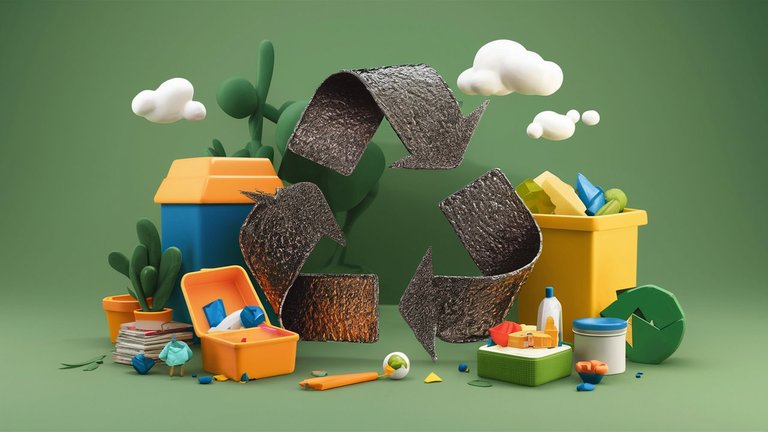Reduce, Re-use & Recycle - Zero waste ecological concept
,
Reduce, Re-use and Recycle! These are three powerful words with their initials beginning with 'Re', which means something that can be done over and over again without running out or being exhausted. I was taught by my basic science teacher about renewable resources and non-renewable resources. Materials such as sunlight, water, trees, grasses, and soil are considered renewable which means they have the ability to occur naturally over time while crude oil or petroleum, steel, metals, and plastics are considered non-renewable resources because of the chemical changes they undergo and heat energy involved.

Environmental pollution increases on a daily basis, some citizens no longer properly dispose of their sewages, and domestic wastes and sometimes even industries and factories dump their chemical wastes in riverine areas which in turn becomes harmful to the lives of the individuals or organisms habiting the environment.
Although one of the duties of government agencies is ensuring that its citizens understand and practice the culture of keeping its environment clean sometimes we find signs that are written boldly in public areas where there are possibilities of loitering the environment with Satchet water, empty water bottles, cans, wraps of biscuits or cookies, a stump of cigarette, chewing gums, etc or Homes where you find wastewater from washings, leftover food, dirt from the kitchen, etc. You find people dumping this waste along the way, in gutters or culverts, in front of their houses, etc.
This careless act or nonchalant act can cause environmental pollution or hazards. Usually, trash cans and Vans are made available by sanitation agencies to easily collect these wastes or dirt and decompose them, thereby adding rich nutrients to the soil which in turn support the growth and development of plants.
Aside from the decomposition of this dirt or solid waste for soil enrichment, environmental pollution is also reduced and brought to a minimum in the community. where these dirt are properly disposed of, the breeding of some microorganisms, bacteria, or pathogenic organisms that can cause harm to human health is controlled.
The World Health Organisation (WHO, Jan 13, 2023) addressed the issues associated with poor sanitation and hygiene, areas with poor sanitation tend to be affected by some soil-transmitted diseases such as Helminths infections, these infections are caused by different species of parasitic worms. In younger children, these infections can cause malnutrition and physical impairment. WHO recommends deworming with medicinal drugs such as Abendazole to curtail the effects of these parasitic worms and proper hygiene.
Today, because of the advancements made by technology, sunlight or solar energy is used to make life more comfortable, and the rays of the sun can be converted to electricity. Some of the appliances manufactured and used today are products of solar energy, since Sunlight is an example of a renewable resource, it points to the fact that it can not be exhausted or run out.
Plastic bottles and containers although not are renewable can be reused either by industries or factories that produce them. whilst some households use these plastic materials for other purposes such as storage of food items. In fact, in a typical African home, nothing is a waste. Empty containers are used to store, seasoning cubes, salt, crayfish, and beans. etc.
Another example is cartons ( papers) which are products obtained from trees (such as pine and aspen) and are renewable resources, when plants decompose or decay, they provide mineral nutrients into the soil and they can grow back naturally. Another benefit of trees or plants generally is the production of Oxygen gas, plants during photosynthesis, release oxygen gas which is abundant in nature and a necessity for living organisms.
Recycling what one considers a waste product is of essence or utmost importance to humanity, for instance, science would describe the processes involved in the water cycle, we know that water can be gained by percolation or infiltration from the soil and can be lost into the atmosphere in form of vapor (a process known as transpiration), from sea, oceans, river, etc and then condensation takes place in the atmosphere and water returns to the earth in form of rainfall.
Due to the circulation and recycling of renewable resources, it is important to note that; water for instance which makes up about 70 percent of the earth, is in abundance. Due to the high demand or usage of water, water obtained from our sewages is treated with chlorine, alum, and other chemicals and made safe for consumption and usage.
This was illustrated by my science teacher years ago when he asked that we get stagnant water from the culvert outside the school compound, this water was stinking really bad that we had to cover our noses, he filtered the water using a filter paper, and he boiled the water for a while and allowed it to cool down, then he added few drops of chlorine. The water was crystal clear and was safe for consumption. This simple experiment was to illustrate how sewages can be recycled. Nothing should be considered a waste or discarded just like that, but find creative ways to shape to usage.
Facing writer's block? Join the lnleo May Writing Prompt today and say goodbye to, "I don't know what to do write about today".
Posted Using InLeo Alpha